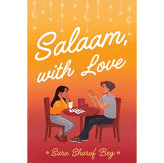It’s important to stay away from books that portray harmful stereotypes
By Amani Salahudeen
September/October 2022
With the constant oversaturation of books every year, one must understand how to look for those that have good Muslim representation (hereinafter “rep”) when selecting them. Even today it’s hard to find novels with practicing Muslim protagonists or talking about their relationship with Islam. Although the community isn’t a monolith, the average practicing Muslim shares certain core values.
Good Muslim rep doesn’t mean that it reflects my personal experience or only positive experiences. Selecting the right books depends on the readers and how observant they are.

Prime examples of good Muslim representation books are those that don’t present a negative portrayal of those who are conservative or struggling to practice. Some novels talk about Sunnis and others talk about Shias, which is something that not everyone is aware of. The best way to decide what constitutes good Muslim rep books is to figure out if the characters practice Islam.
According to Muslim writer Bashirat Oladele, Muslim authors must write with a diverse community in mind. From his perspective, a good rep of Muslims in novels occurs when authors avoid the typical stereotypes. Oladele emphasizes the importance of seeing Muslims as people, as opposed to terrorists. “How about we focus on representing Muslims who enjoy being Muslim and have interests outside their identity as a Muslim? In the West, struggle is a part of the Muslim experience, but by no means does it define the Muslim experience — whatever that may be because we are all diverse individuals going on different journeys. Not to dismiss those who like the ‘captain saves a hijabi’ narrative, but it is old and overdone. I will be mainly speaking about fiction books [novels] because it is what I enjoy reading, but prior to this I need to shout out It’s Not About the Burqa. Shortlisted, rightfully so, as ‘Foyles Non-Fiction Book of the Year’ in 2019, it touches upon topics such as mental health, sex, identity, and finances”.
The Riz Test — inspired by actor Riz Ahmed’s 2017 speech in the House of Commons on diversity on screen, it contains five criteria to measure how Muslims are portrayed on film and TV — is the best way to evaluate a book or media piece’s accurate portrayal of Muslims. Riz Ahmed is an Oscar-nominated Muslim actor who created a pass or fail grade to determine if Muslim characters are portrayed accurately. It does this by answering five questions: “If the film/show stars at least one character who is identifiably Muslim (by ethnicity, language or clothing), is the character talking about, the victim of or the perpetrator of terrorism? • Presented as irrationally angry? • Presented as superstitious, culturally backward or anti-modern? • Presented as a threat to a Western way of life? • If the character is male, is he presented as misogynistic? or if female, is she presented as oppressed by her male counterparts?”

If any of the above are “Yes,” then it has failed the Riz Test. For example, in Huda Fahmy’s “Huda F Are You?” she draws a cartoon version of herself to tell her story. Her graphic novel passes the test and even shows her immigrant parents in a more positive light than mainstream media usually do. It was truly heartwarming to see that kind of representation in this Own Voices book told from a young Huda’s perspective. It discusses periods, hate crimes, and relationships (both platonic and conversations Huda has with her husband). She also explains why she called it “Huda F Are You?”
Another good example is Sara Sharaaf Beg’s “Salaam, With Love,” a story about exploring growth in faith. The protagonist, Du’a, is a child of immigrant parents who both argues and gets along with them — rather refreshing to see in a coming-of-age story. Throughout the novel, she prays either at home or the masjid. I loved how her family celebrated Ramadan. Du’a struggles a bit with balancing culture, religion and who she wants to be. It was also incredible to see a large Muslim family in a novel.
One of the most memorable quotes is, “There is no faith without trust, and there is no trust without faith; they go hand in hand.” In short, “Salaam, With Love” passes the Riz Test. Du’a is never described as a terrorist, is never irrationally angry or culturally backward or a threat to Western life and isn’t oppressed by the men in her life.
On the other hand, Tashie Bhuiyan’s “Counting Down With You” presents Karina, the protagonist, as stating, “My grandparents are extremely traditional, and I understand. It’s all they’ve ever known.” This quote makes it seem as if Karina believes she’s inferior to her grandparents. This violates the Riz Test because the story’s perspective is that practicing Muslims are anti-modern and thus culturally backward. Karina also constantly complains about being oppressed by her parents — another violation — as is her statement, “I wish we could all live our lives in peace, without these expectations that seem to dictate our every breath.”
Another book that fails this test is Tahereh Mafi’s “A Very Large Expanse of Sea,” in which 16-year-old Shirin is bitter after dealing with numerous racist events in a post-9/11 world. Mafi writes a romance between a Muslim girl and a non-Muslim boy named Ocean, which violates Islam, but not the test. However, the novel’s depiction of Muslims acting violently does violate ate the test. I wouldn’t recommend adding this book to classroom libraries. Unlike in “Counting Down With You,” “A Very Large Expanse of Sea” shows Shirin embracing her culture and taking pride in it.
To conclude, one should read a wide variety of Muslim rep books and understand that readers might not relate to certain characters who may be portrayed as more (or less) practicing than the reader. Evaluate which novels to bring into the classroom or home libraries. At the very least, use the Riz Test to determine if it should be recommended to others. Some Muslim rep books are solely based on the author’s own experiences, thus often making it a self-insert story. Representation means a lot to readers, and good representation is even more important.
At the end of the day, everyone is responsible for the books they read, so learn how to determine if a novel constitutes as having good or accurate Muslim representation.
Amani Salahudeen, has a B.A. in Journalism and professional writing from The College of New Jersey and isand is currently pursuing a graduate degree in English education.
Tell us what you thought by joining our Facebook community. You can also send comments and story pitches to horizons@isna.net. Islamic Horizons does not publish unsolicited material.
